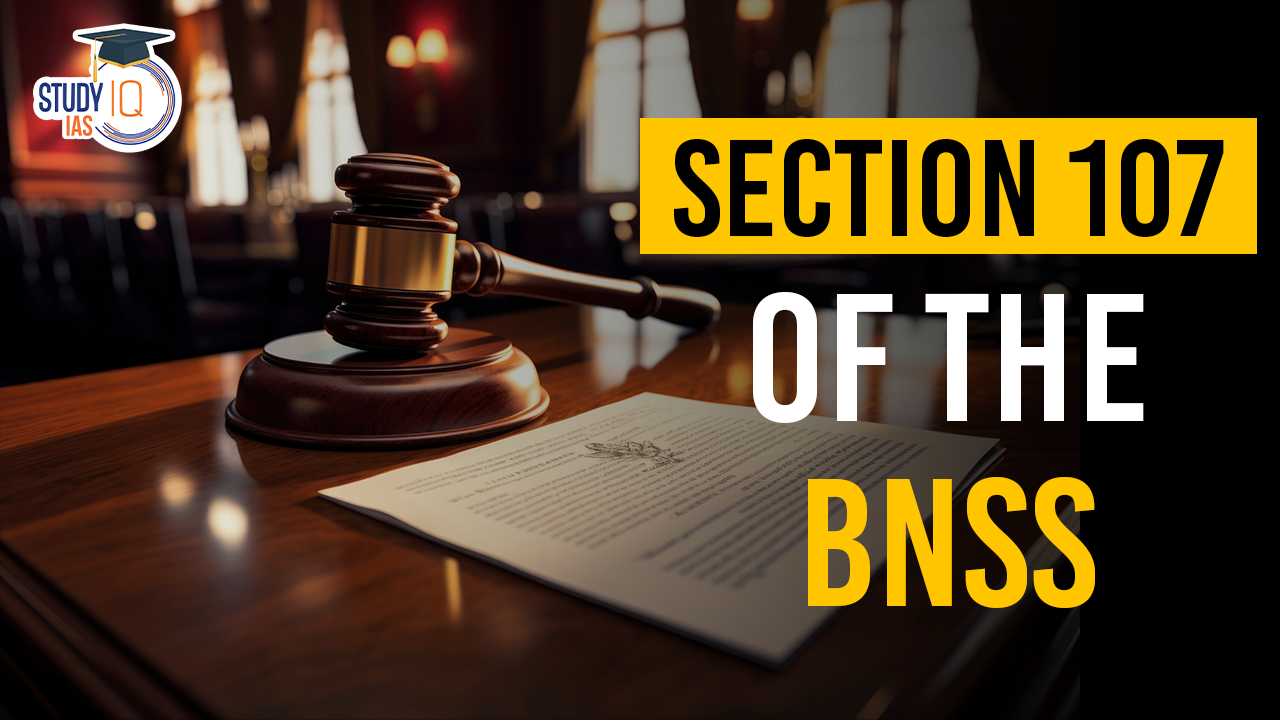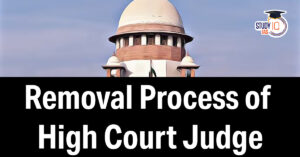Table of Contents
Context: Section 107 of the Bharatiya Nagarik Suraksha Sanhita (BNSS), 2023 introduces the concept of handling properties that are considered “proceeds of crime.”
More in News
- Previously, this term was primarily associated with the Prevention of Money Laundering Act (PMLA), 2002 and a chapter in the erstwhile Code of Criminal Procedure (CrPC) related to reciprocal arrangements for property forfeiture and attachment.
- Sections 82 and 83 of the CrPC (dealing with property attachment of absconding persons) have been replicated under Sections 84 and 85 of the BNSS, with some minor modifications.
- However, Section 107 of the BNSS is a new provision not found in the CrPC. It gives courts broad powers to attach property (upon police request during investigation) and forfeit the proceeds of crime to the government under certain conditions.
Authority and Powers Under Section 107
- Any police officer conducting an investigation can apply for property attachment if they have reason to believe the property is derived from a criminal activity, with approval from a Superintendent or Commissioner of Police.
- Property can be attached during the investigation itself, even before submitting a report to the magistrate under Section 173 of CrPC (which happens after completing an investigation).
Process of Disposal Under Section 107
- Section 107 allows courts to order District Magistrates to distribute proceeds of crime to those affected, without specifying the stage at which this should be done. If there are no claimants or surplus remains, the proceeds are forfeited to the government.
- This is problematic as property can theoretically be disposed of in three months, even if the investigation or trial has not concluded.
Relevant Provisions from CrPC and BNSS
- An entire chapter in the BNSS replicates CrPC provisions for the disposal of property, with one notable exception: Section 497 of BNSS mandates the court or magistrate to take a photo or video of the property, which can be used as evidence during trials.
- The Supreme Court case (Sunderbhai Ambalal Desai v. State of Gujarat, 2003) emphasised the importance of promptly recording evidence to avoid tampering and ensure safekeeping of articles.
Safeguards in Section 107
- Before attachment, the court must issue a show-cause notice returnable in 14 days. If the individual concerned does not represent their case, an ex parte order may be passed.
- After finding the attached property to be proceeds of crime, the court may order the District Magistrate to distribute the property to claimants within 60 days.
Concerns
- Unlike the PMLA, where officers must record reasons in writing and can only provisionally attach property for up to 90 days, Section 107 of the BNSS lacks such detailed conditions. There is no requirement for officers to record reasons in writing.
- Section 107 does not specify the timing of property disposal, unlike the PMLA, which mandates disposal only after the conclusion of a trial.
- There are no guidelines on how the District Magistrate should identify rightful claimants, leaving room for potential procedural gaps and issues in implementation.
- Section 107 introduces several legal and practical challenges:
- It is difficult for investigating officers to identify rightful claimants of the proceeds of crime.
- The final disposal of property without a proper trial does not align with principles of justice and fairness.
- While the legislative intent is to empower States (as PMLA is a Central Act) to expedite the distribution of proceeds of crime, the procedure appears flawed.
| Article 300A of the Constitution |
| Article 300A of the Constitution protects individuals from being deprived of property without authority of law, which is considered a basic human right. The law must be just, fair, and reasonable. |
Conclusion
Section 107 of the BNSS introduces broad powers to deal with proceeds of crime but raises concerns regarding the lack of clarity on procedure, safeguards, and disposal timing. While it empowers the States to expedite these matters, the absence of proper guidelines and constitutional challenges may result in significant legal and practical difficulties.


 Transfer and Removal Process for High Co...
Transfer and Removal Process for High Co...
 National Judicial Appointments Commissio...
National Judicial Appointments Commissio...
 Draft Digital Personal Data Protection R...
Draft Digital Personal Data Protection R...





















